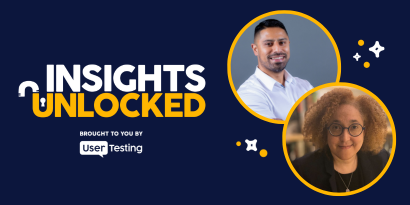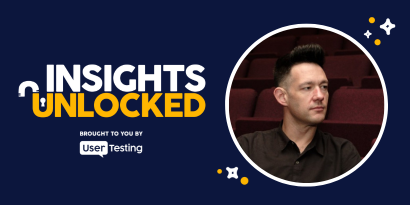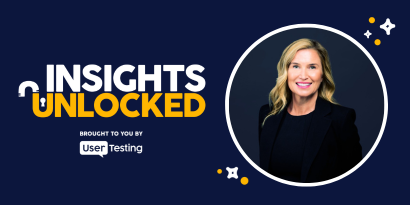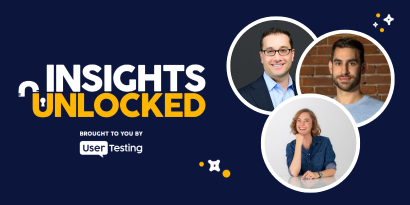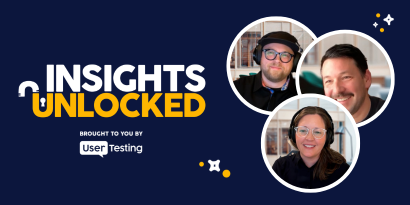
Episode 83 | July 17, 2023
How to recession proof your UX research career with Sarah Doody
In this week’s Insights Unlocked, Sarah Doody talks with UserTesting’s CEO Andy MacMillan about navigating your UX career over the next 1 to 2 years.
How to recession proof your UX research career with Sarah Doody
In today's fast-paced digital world, the user experience (UX) and experience research (XR) fields are constantly evolving, presenting both challenges and exciting opportunities for professionals.
In this week’s Insights Unlocked, Sarah Doody talks with UserTesting’s CEO Andy MacMillan about navigating your UX career over the next one to two years.
The episode delves into crucial themes that resonate with UX researchers, designers, and product managers. From coping with tech layoffs to understanding the impact of AI, this blog post explores the key takeaways and practical insights shared in the episode.
To tee up their conversation, we asked UX professionals in the UserTesting Contributor Network how they viewed their job outlook over the next two years. Their responses were a mix of long-term optimism and near-term angst (watch the video below).
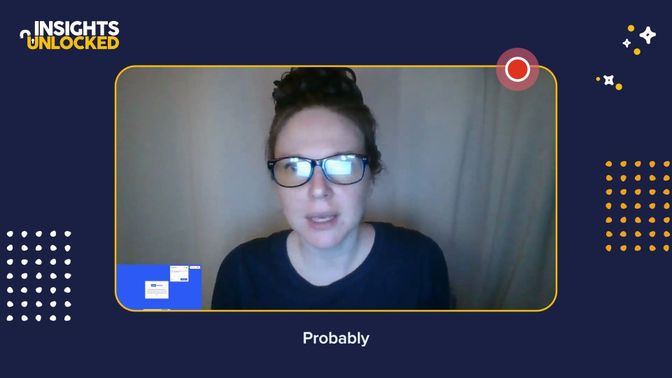
Tech Layoffs: A Reality Check
Layoffs in the tech industry have become a reality for many people. But on the positive side, recent news shows the overall labor market is still pretty strong. And in our podcast interview with Jakob Neilsen, principal and co-founder of the Nielsen Norman Group, he forecasted the UX profession is expected to grow from the current approximately 1.5 million people, to a whopping 100 million people by 2050
“I think what people need to realize is there are so many other companies in industries outside tech that are hiring, that have digital products, that need researchers, that need designers, and specifically, I think about healthcare, education, government and energy,” Doody said.

MacMillan agrees. “You mentioned things like healthcare and government. Think of all the places where we would all benefit with a better customer experience and you could literally touch millions and millions—tens of millions—of people with the things you could be working on.”
By broadening their horizons, candidates can uncover exciting opportunities with companies that value digital products and innovation.
The Power of AI in UX
AI is transforming many industries, including UX design and research. While AI has its place in the UX process, Doody said, it is crucial to understand that it cannot replace the ingenuity of human researchers and designers. The human touch, context, and business acumen play a pivotal role in making informed decisions and solving complex problems, she said.
Doody said whether it is the latest AI tool or the trendy design platform, the output is only as good as the person's knowledge who is using the tool. While it is important to know how to use the latest tools, she said just as important is continuing to invest in the timeless skills that will make you a more in-demand professional such as your written and spoken communication, critical thinking and research skills.
Timeless Skills for UX Excellence
To address near-term challenges, Doody offered 3 tips for making yourself recession proof:
- Create a career roadmap. You may be a researcher now, but what skills and experiences do you need to become a research manager four years from now?
- Ongoing professional development. Sure, learning AI-related software and tools will soon be a must-have, but you should also work on those timeless skills: written and spoken communication, and critical thinking.
- Make sure all of your career materials are up to date and ready to go, meaning your resume, your LinkedIn profile, and your portfolio, “because you never know when an opportunity might come your way.”
If you do this once then it's just a matter of refreshing them every year or twice a year. “And it won't be this Herculean task that you have to take on every time you're thrown into a job search that you initiated or that was initiated for you,” Doody said.
Key takeaways
- Candidates should be open to exploring opportunities beyond well-known tech companies and consider industries that may be less trendy, but have a greater need for UX designers and researchers
- Life and UX research skills—such as communication, critical thinking, and research prowess—will always have an greater ROI over learning about trendy software or tools
- Preparing for career changes or opportunities by keeping career materials such as your LinkedIn profile, portfolio and resume up-to-date (plan to do it about twice a year); and strategically planning for for your career growth
Episode links:
Listeners can learn more about Sarah Doody and Career Strategy Lab can visit her website, www.careerstrategylab.com or listen to her Career Strategy Podcast at www.careerstrategylab.com/podcasts

